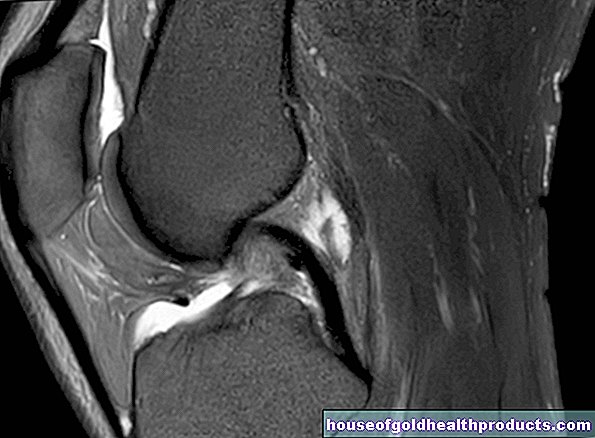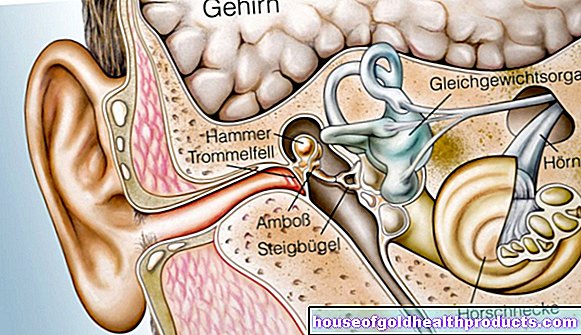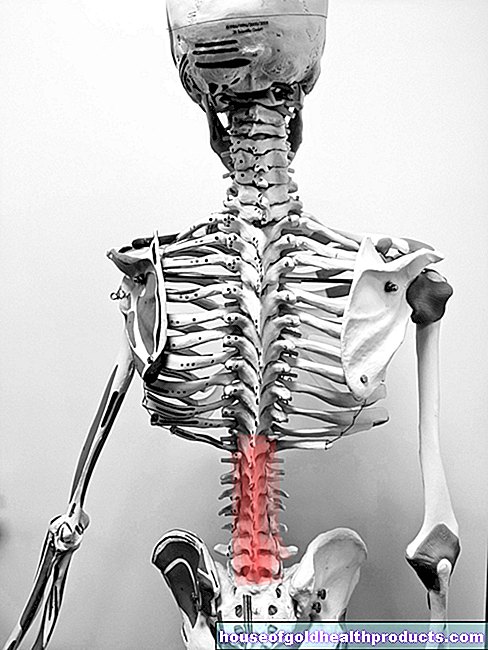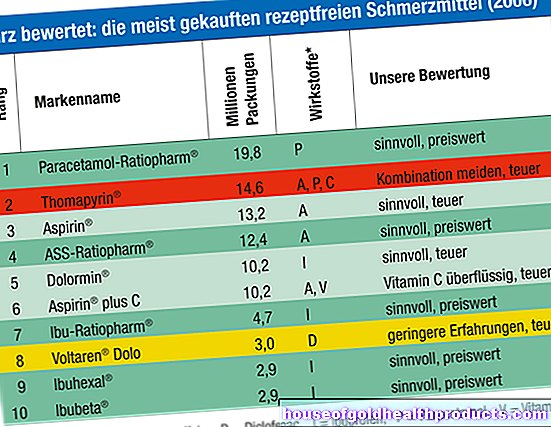Bupropion
All content is checked by medical journalists.Bupropion is an active ingredient with various uses: It is used both as an antidepressant and as a means of smoking cessation. Its effect is based on the ability to intervene in the neurotransmitter balance of the brain. Read more about the effects, side effects and uses of bupropion here.
This is how bupropion works
In the brain, the interaction of different messenger substances (neurotransmitters) ensures that one feels balanced and can react appropriately to different situations. The neurotransmitters are the signal carriers between the nerve cells: triggered by an electrical impulse, a nerve cell can release a neurotransmitter into the tiny gap (synapse) that represents the contact point to the next nerve cell. The messenger substance migrates to the neighboring cell, docks there and also triggers an electrical impulse there. This will transmit a signal. The first nerve cell then takes up the messenger substance again, which ends its effect.
Depression is caused by a lack of neuronal messenger substances such as dopamine and norepinephrine in the brain. This is where bupropion comes in: it inhibits the re-uptake of noradrenaline and dopamine in the original cell, which means that they can work for longer. This will alleviate depressive symptoms.
The mechanism of action of bupropion as a smoking cessation agent is still unknown.
Bupropion uptake, breakdown and excretion
The active ingredient is taken as a tablet by mouth (orally). About 87 percent of the active ingredient is then absorbed into the bloodstream via the intestines. There, bupropion binds to plasma proteins and is thus distributed in the body. The highest plasma concentration in the blood is reached after two and a half to three hours. The active ingredient is mainly metabolized in the liver and excreted in the urine. An average of eleven to 14 hours after ingestion, half of the bupropion and its active metabolic products have left the body.
When is bupropion used?
Bupropion is primarily used to treat depression. It is also approved for smoking cessation, in conjunction with supportive motivational measures.
This is how bupropion is used
Treatment with bupropion is started with 150 milligrams a day and then increased to 150 milligrams twice a day. When using sustained-release preparations (tablets with delayed release of the active ingredient), the active ingredient is only taken once a day. The drug takes effect after seven to 28 days. The duration of the treatment takes place over several weeks and is determined by the doctor.
In certain cases, the doctor will prescribe a reduced dose, for example in the case of impaired kidney or liver function.
What are the side effects of bupropion?
The most common side effects with bupropion are insomnia, headache, dry mouth and gastrointestinal disorders (such as nausea and vomiting).
Patients often develop hypersensitivity reactions (such as hives), loss of appetite, agitation and anxiety, tremors, dizziness, taste and vision disturbances, ringing in the ears (tinnitus), increased blood pressure, flushing of the face, abdominal pain, constipation, fever, chest pain, and general weakness.
Uncommon side effects of bupropion include weight loss, depression and confusion, difficulty concentrating, and accelerated heartbeat (tachycardia).
Rarely or very rarely, for example, severe hypersensitivity reactions (such as shortness of breath), seizures, blood sugar fluctuations, coordination disorders, memory problems, abnormal sensations, drop in blood pressure, jaundice, inflammation of the liver (hepatitis) and muscle sugar.
If you experience severe side effects or those not mentioned above, please consult your doctor.
In patients with depression, there is an increased risk of suicide at the start of treatment and when the dose is adjusted.
What should be considered when taking bupropion?
You shouldn't use bupropion if you:
- are allergic to the active substance or other components of the drug
- have a central nervous system tumor
- have severe cirrhosis of the liver
- take so-called monoamine oxidase inhibitors (MAOIs) (for depression or Parkinson's disease)
Interactions
Bupropion can interact with various substances and thus influence their effectiveness. Examples:
- certain medicines for irregular heartbeat (such as propafenone, flecainide)
- Beta blockers (cardiovascular drugs)
- Insulin (diabetes drug)
- Anti-epilepsy drugs (such as carbamazepine, phenobarbital, phenytoin)
- Parkinson's disease agents (levodopa, amantadine)
pregnancy and breast feeding period
During pregnancy, mothers with depression should avoid taking bupropion whenever possible, but instead use better-researched antidepressants. If a woman becomes pregnant during treatment with the antidepressant and she is stable, a change is not indicated. The unborn baby and, after the birth, the newborn baby and the woman should then be closely monitored.
The use of bupropion for smoking cessation during pregnancy must be checked very carefully by the doctor if necessary.
The active ingredient should only be taken during breastfeeding if absolutely necessary. The nursing child must be carefully observed.
Driving and using machines
Bupropion acts on the central nervous system and can cause dizziness, concentration and coordination disorders, among other things. This endangers the safe participation in road traffic and the safe operation of machines.
How to get bupropion medication
Bupropion is only available from pharmacies with a prescription.
Tags: pregnancy nourishment foot care





























